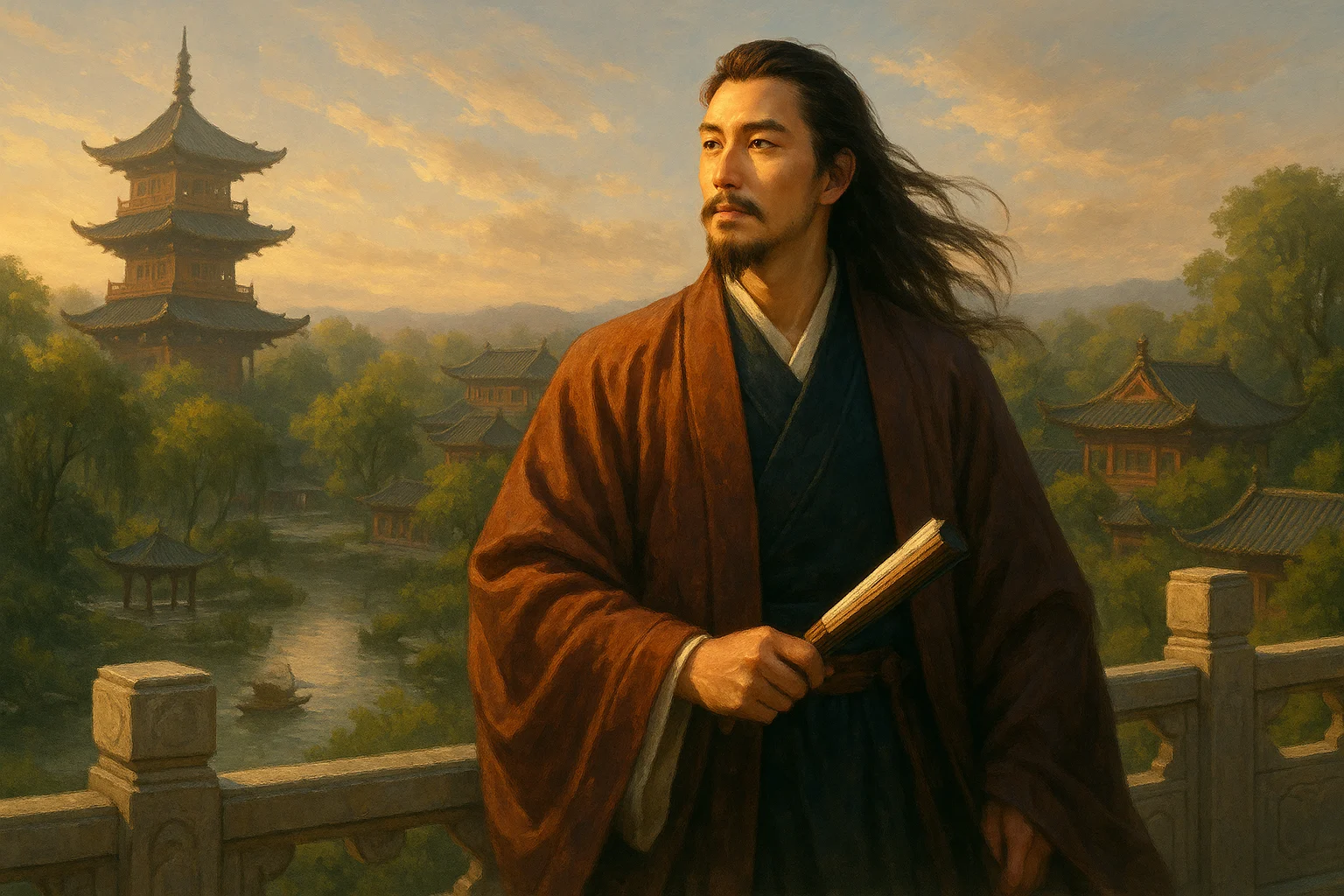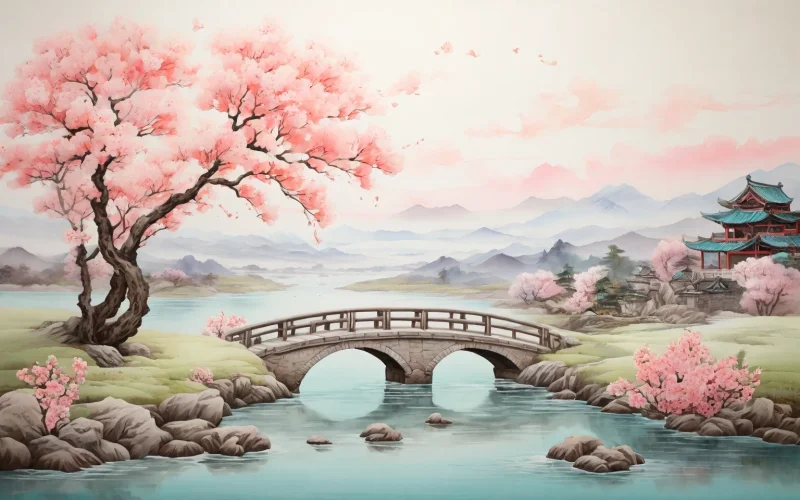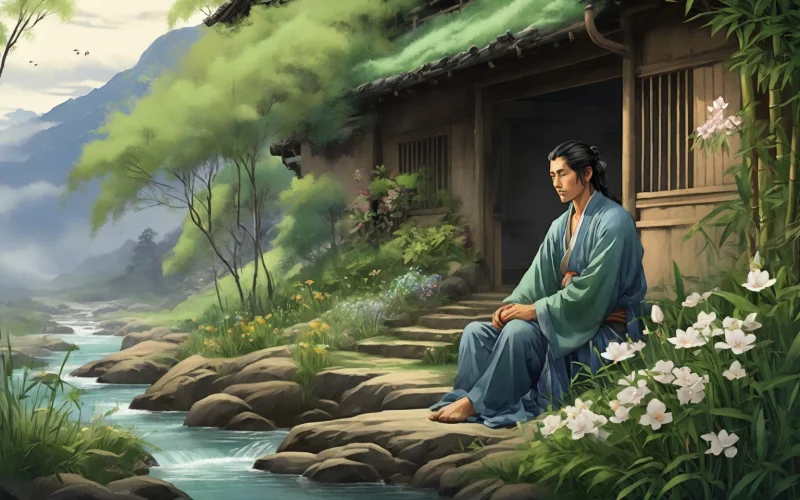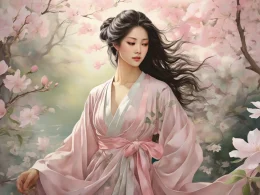The winding stream knots each flower tight,
All shadows vie for spring's sovereign right.
Rather be wind-blown snowflakes born—
Than roadside dust by cartwheels torn.
Original Poem
「北陂杏花」
王安石
一陂春水绕花身,花影妖娆各占春。
纵被春风吹作雪,绝胜南陌碾成尘。
Interpretation
This poem was composed during Wang Anshi's retirement at Dinglin Mountain in Jiangning after his dismissal as chancellor. Appointed twice as prime minister from 1070 (Xining era) and dismissed twice, he ultimately withdrew to a life of quietude in the mountains. Yet though physically removed from court, his convictions remained unshaken. During his Jiangning years, he often expressed his unyielding character and political stance through poetry. This work, born from a state of serene detachment, uses mountain spring blossoms as a metaphor for his refusal to conform to vulgar trends, revealing his transcendent attitude toward political setbacks and his resolute character.
First Couplet: "一陂春水绕花身,花影妖娆各占春。"
Yī bēi chūn shuǐ rào huā shēn, huā yǐng yāo ráo gè zhàn chūn.
A pool of springwater curls round the blossoms,
their shadows enchanting—each claims spring's glory.
This couplet depicts apricot blossoms blooming by the water. The verb "curls" (绕) masterfully captures both the water's meandering flow and the intimate bond between flowers and stream. The second line portrays the blossoms' grace through dual perspectives—flowers and their reflections—with "enchanting" (妖娆) animating static scenery. "Each claims spring's glory" (各占春) highlights how both forms share nature's beauty equally, reflecting the poet's love for secluded elegance.
Second Couplet: "纵被春风吹作雪,绝胜南陌碾成尘。"
Zòng bèi chūn fēng chuī zuò xuě, jué shèng nán mò niǎn chéng chén.
Though spring winds scatter them like snow,
they surpass blossoms crushed to dust on southern paths.
Transitioning from scene to contemplation, this couplet uses the blossoms' fate to articulate the poet's steadfastness. "Though" (纵) introduces their inevitable fall, with "scatter like snow" (吹作雪) rendering their descent ethereal rather than tragic. The decisive "they surpass" (绝胜) contrasts northern purity ("snow") with southern degradation ("dust"), symbolizing Wang's choice of noble isolation over worldly compromise. The geographic opposition (northern pool vs. southern road) crystallizes his spiritual stance against societal conformity.
Holistic Appreciation
The poem begins with waterside blossoms, progresses to their graceful fall, and culminates in a declaration of moral supremacy. Its apparent delicacy conceals tensile strength, its lyrical surface veiling sharp critique. The apricot blossoms transcend botany to become the poet's avatar; verbs like "curl," "enchant," "scatter," and "crush" weave imagery into philosophy. Every element—the secluded pool, the dual reflections, the clean snow versus vulgar dust—resonates with layered meaning.
Artistic Merits
- Nature as moral allegory
The apricot blossoms embody unyielding integrity, transforming floral observation into spiritual self-portraiture. - Architectural precision
Four lines progress seamlessly from description to declaration, each couplet serving distinct yet interconnected purposes. - Symbolic antithesis
The "northern pool" and "southern path" transcend geography to represent irreconcilable life choices—purity versus compromise. - Lexical potency
Verbs like "curl" (绕) and "enchant" (妖娆), coupled with metaphors like "snow" and "dust," create vivid aesthetic and philosophical impressions.
Insights
More than floral homage, this is a manifesto of ethical resistance. It teaches that one should prefer dignified dissolution like wind-scattered petals over compromised survival as trampled dust. Wang's apricot blossoms become timeless emblems of intellectual independence—their lesson echoing across centuries: true nobility lies not in worldly success but in unbroken authenticity. This moral clarity, distilled into twenty-eight characters, remains urgently relevant for any era valuing principle over popularity.
About the Poet

Wang Anshi (王安石 1021 - 1086), a native of Linchuan in Jiangxi, was an outstanding statesman, writer, and thinker of the Northern Song Dynasty, counted among the "Eight Great Prose Masters of the Tang and Song Dynasties." His poetic achievements were particularly profound—his early works, filled with heroic language, revealed the ambition of a reformer. Though his ci poetry was few in number, it pioneered new realms of historical reflection. His poetry and prose combined intellectual depth with artistic value, and the over 1,500 works preserved in The Collected Works of Linchuan stand as a monumental testament to literary innovation in Song Dynasty literature.












